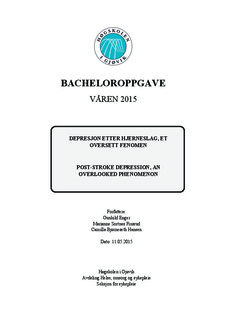| dc.contributor.author | Enger, Gunhild | |
| dc.contributor.author | Finsrud, Marianne Sortnes | |
| dc.contributor.author | Hansen, Camilla Bjørneseth | |
| dc.date.accessioned | 2015-07-16T11:02:00Z | |
| dc.date.available | 2015-07-16T11:02:00Z | |
| dc.date.issued | 2015 | |
| dc.identifier.uri | http://hdl.handle.net/11250/293282 | |
| dc.description.abstract | NORSK: Bakgrunn: Depresjon er et alvorlig og oversett fenomen etter et hjerneslag, som kan få konsekvenser for
livskvalitet. Depresjon forekommer hos ca. 20-40% hos personer etter et hjerneslag. Antall hjerneslag de
neste 20 årene vil øke med 50%. Dette fordi det blir flere eldre i årene som kommer.
Hensikt: Undersøke om depresjon etter et hjerneslag har en innvirkning på livskvaliteten hos denne
pasientgruppen. For å undersøke dette blir det nyttig å vurdere ulike aspekter en sykepleier kan
implementere i sitt kliniske arbeid med pasienter som lider av depresjon.
Metode: Litteraturstudie med søk i databaser: Ovid Nursing Database, Cinahl og Pubmed. Benyttet
søkeord: hope, rehabilitation, stroke, quality of life, depression, health related quality of life, recovery,
self-efficacy, stroke rehabilitation, coping strategies, poststroke depression, nursing, caregivers, health care.
Resultat: Det kommer frem ulike faktorer som kan påvirke depresjon og herav livskvalitet; mangel på
kunnskap hos sykepleier og strukturerte kartleggingsverktøy, mangelfull informasjon/undervisning til
pasient og pårørende, nedsatt fysisk funksjon og mestringsstro. Mangel på håp, ensomhet og sosial
isolasjon har en innvirkning.
Konklusjon: Sykepleierens væremåte og kompetanse ses som grunnleggende for å påvirke livskvaliteten til
personer med depresjon etter et hjerneslag. Ved bruk av ulike strategier og intervensjoner kan sykepleiere
redusere depressive symptomer, som er av betydning for livskvalitet. | nb_NO |
| dc.description.abstract | ENGLISH: Background: Depression is a serious and overlooked phenomenon after a stroke, which can cause
consequences for the persons quality of life. 20-40% of the people that has been through a stroke will
subsequently suffer from depressions. The number of stoke patients will increase with 50% the next 20
years as a result of an increasing population of aging people.
Purpose: The purpose of this survey is to figure out whether the depression will make a change in
the patients quality of life. When you are going to investigate this, it is useful to consider various aspects a
nurse can implement in their clinical work with patients suffering from depression.
Methods: Literature review with database searches: Ovid Nursing Database, Cinahl og Pubmed. Used
keywords: hope, rehabilitation, stroke, quality of life, depression, health related quality of life, recovery,
self-efficacy, stroke rehabilitation, coping strategies, poststroke depression, nursing, caregivers, health care.
Results: It appears that different factors can affect depression and hence the quality of life; lack of
knowledge within the nursing profession and structured assessment tools, inadequate information to the
patients and their families, physical functioning and self-efficacy. Also the lack of hope, loneliness and
social isolation has an impact in this matter.
Conclusion: The way the nurses behave and their knowledge is seen as a basic requirement to affect the
quality of life for those who suffers from depression after a stroke. Using different strategies and
interventions the nurse can reduce the depressive symptoms, which are of importance for the quality of the
patients life. | nb_NO |
| dc.language.iso | nob | nb_NO |
| dc.subject | depresjon | nb_NO |
| dc.subject | hjerneslag | nb_NO |
| dc.subject | livskvalitet | nb_NO |
| dc.title | Depresjon etter hjerneslag: et oversett fenomen | nb_NO |
| dc.title.alternative | Post-stroke depression: an overlooked phenomenon | nb_NO |
| dc.type | Bachelor thesis | nb_NO |
| dc.subject.nsi | VDP::Medical disciplines: 700::Health sciences: 800::Nursing science: 808 | nb_NO |
| dc.source.pagenumber | 69 | nb_NO |
